MARKETING
17 Books Perfect for Content Marketers (That Aren’t About Content or Marketing)
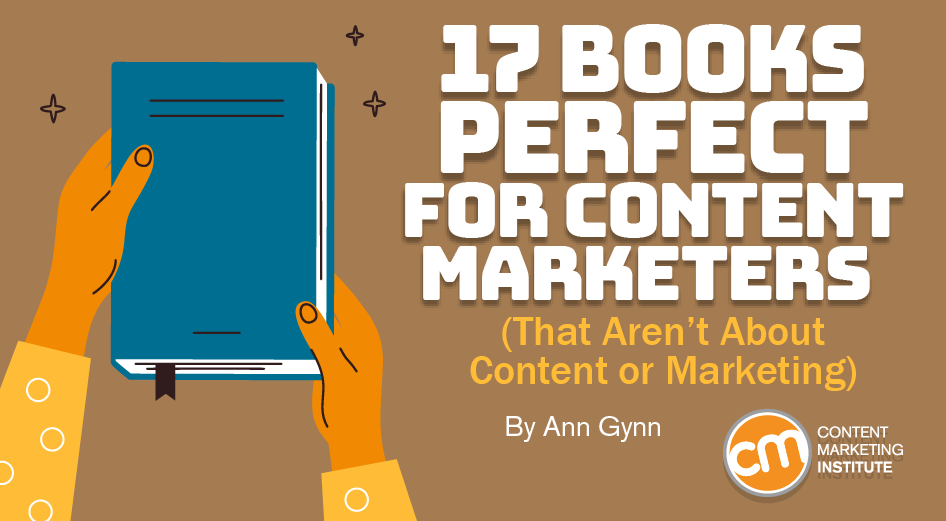
Inspiration and motivation can come from unexpected places. That’s what we found when we asked marketers and other business people to share their go-to book for marketers.
Many people recommended books about content and marketing (read those recommendations here). But others suggested intriguing books that aren’t directly about marketing at all.
These 17 recommendations range from one that’s more than 2,000 years old to a modern story about sushi. Some are focused on building you, while others will inspire your creativity, change the way you think about your content marketing, help you avoid procrastination, and more.
Inspiration and motivation for your #ContentMarketing can come from unexpected places, like 2,000-year-old treatise or a #book about sushi, says @AnnGynn via @CMIContent. Click To Tweet
 What Amazon says: This beloved classic presents a principle-centered approach for solving both personal and professional problems. With penetrating insights and practical anecdotes, Stephen R. Covey reveals a step-by-step pathway for living with fairness, integrity, honesty, and human dignity—principles that give us the security to adapt to change and the wisdom and power to take advantage of the opportunities that change creates.
What Amazon says: This beloved classic presents a principle-centered approach for solving both personal and professional problems. With penetrating insights and practical anecdotes, Stephen R. Covey reveals a step-by-step pathway for living with fairness, integrity, honesty, and human dignity—principles that give us the security to adapt to change and the wisdom and power to take advantage of the opportunities that change creates.
Recommended by Steve Pogson, founder and e-commerce strategy lead, First Pier: “As a marketer and leader, these seven habits guided me. I realized that being a leader isn’t just about achieving success; it’s also about upholding ideals and ethics in order to leave a lasting legacy. This understanding had a significant impact on my decisions as a marketing executive.”
 What Amazon says: In many crucial areas of our lives, reason plays a vanishingly small part. Instead, we are driven by unconscious desires, which is why placebos are so powerful. We are drawn to the beautiful, the extravagant, and the absurd – from lavish wedding invitations to tiny bottles of the latest fragrance. So if you want to influence people’s choices, you have to bypass reason. The best ideas don’t make rational sense: they make you feel more than they make you think.
What Amazon says: In many crucial areas of our lives, reason plays a vanishingly small part. Instead, we are driven by unconscious desires, which is why placebos are so powerful. We are drawn to the beautiful, the extravagant, and the absurd – from lavish wedding invitations to tiny bottles of the latest fragrance. So if you want to influence people’s choices, you have to bypass reason. The best ideas don’t make rational sense: they make you feel more than they make you think.
Recommended by Jonathan Tian, co-founder, Mobitrix: “In this book, the writer highlights the complex theory with stories and great humor to both captivate and entertain. It’s a crucial work of evident irrationality.”
 What Amazon says: Art of War is almost certainly the most famous study of strategy ever written. This treatise has been credited with influencing some of the most legendary military operations. Beyond the battlefield, people far and wide have long turned to Art of War for advice on how to succeed in various competitive situations, and companies around the world now make this book required reading for their executives.
What Amazon says: Art of War is almost certainly the most famous study of strategy ever written. This treatise has been credited with influencing some of the most legendary military operations. Beyond the battlefield, people far and wide have long turned to Art of War for advice on how to succeed in various competitive situations, and companies around the world now make this book required reading for their executives.
Recommended by Chris Alexakis, co-founder Cabinet Select: “There are many essential lessons business owners can learn from Sun Tzu’s book about ancient military strategy. However, you have to look at it with different eyes than the average reader because what’s important here is the mentality and philosophical lessons. You don’t need to know how many chariots an army needs to store food.”
 What Amazon says: If you’re having trouble changing your habits, the problem isn’t you. The problem is your system. Bad habits repeat themselves again and again not because you don’t want to change but because you have the wrong system for change. You do not rise to the level of your goals. You fall to the level of your systems. Here, you’ll get a proven system that can take you to new heights.
What Amazon says: If you’re having trouble changing your habits, the problem isn’t you. The problem is your system. Bad habits repeat themselves again and again not because you don’t want to change but because you have the wrong system for change. You do not rise to the level of your goals. You fall to the level of your systems. Here, you’ll get a proven system that can take you to new heights.
Recommended by Ori Benshalom, founder, Self Made: “As a marketer, I was always intrigued by why people do what they do. Atomic Habits breaks down exactly what creates good habits and how you can break bad ones. One of the biggest takeaways for me was that if you want to create a new habit, start small and build it gradually.”
 What Amazon says: Gay Hendricks demonstrates how to eliminate the barriers to success by overcoming false fears and beliefs. Fans of Wayne Dyer, Eckhart Tolle, Marianne Williamson, and The Secret will find useful, effective tips for breaking down the walls to a better life in The Big Leap.
What Amazon says: Gay Hendricks demonstrates how to eliminate the barriers to success by overcoming false fears and beliefs. Fans of Wayne Dyer, Eckhart Tolle, Marianne Williamson, and The Secret will find useful, effective tips for breaking down the walls to a better life in The Big Leap.
Recommended by Laura Rike, consultant: “It teaches us that when we feel like life is getting in the way, we need to push through to reach our true potential and push past our upper limit.”
 What Amazon says: Drawing on more than a decade of new work, Kim and Mauborgne show you how to move beyond competing, inspire your people’s confidence, and seize new growth, guiding you step-by-step through how to take your organization from a red ocean crowded with competition to a blue ocean of uncontested market space. They show why nondisruptive creation is as important as disruption in seizing new growth.
What Amazon says: Drawing on more than a decade of new work, Kim and Mauborgne show you how to move beyond competing, inspire your people’s confidence, and seize new growth, guiding you step-by-step through how to take your organization from a red ocean crowded with competition to a blue ocean of uncontested market space. They show why nondisruptive creation is as important as disruption in seizing new growth.
Recommended by Sep Niakan, managing broker, CondoBlackBook: “Suitable for anyone who wishes to make significant improvements in their marketing strategy. It comprises a road map drawn out by the authors, who have a startling 30 years of consulting and research experience and who carve out the way for easier and more successful reinventions.
“This book will help people from reinvention teams by answering questions about how and why each baby step toward reinvention is carried out. It also emphasizes things such as respecting your team’s feelings and delving into the details of everything, leaving little to chance.”
 What Amazon says: This passionate expertise manifesto is intended to elevate the impact of advisors who sell insight as entrepreneurs. Three foundational chapters form the basis of the entire book: experts develop insight by isolating patterns in data; they convert those insights to wealth by crafting a unique positioning for which few available substitutes exist. Their confidence grows as the marketplace embraces their application of expertise.
What Amazon says: This passionate expertise manifesto is intended to elevate the impact of advisors who sell insight as entrepreneurs. Three foundational chapters form the basis of the entire book: experts develop insight by isolating patterns in data; they convert those insights to wealth by crafting a unique positioning for which few available substitutes exist. Their confidence grows as the marketplace embraces their application of expertise.
Recommended by Joshua Feinberg, CEO, SP Home Run: “If you sit still too long, even the best content marketers will get commoditized and marginalized. David C. Baker offers a great solution around focus, deep expertise, selecting the right niches, positioning, and demonstrating expertise.”
 What Amazon says: Practical, proven self-help steps show how to transform 40 common self-defeating behaviors, including procrastination, envy, obsession, anger, self-pity, compulsion, neediness, guilt, rebellion, inaction, and more.
What Amazon says: Practical, proven self-help steps show how to transform 40 common self-defeating behaviors, including procrastination, envy, obsession, anger, self-pity, compulsion, neediness, guilt, rebellion, inaction, and more.
Recommended by Brenton Thomas, founder and CEO, Twibi: “Working on marketing, we are all susceptible to falling into the impostor syndrome or the procrastination traps. This book has plenty of actionable strategies to snap out of those destructive creativity-killer habits and transform them into deadline-smashers.”
 What Amazon says: Somehow some people become quite accomplished at managing information flow. Daniel Levitin uses the latest brain science to demonstrate how those people excel—and how readers can use their methods to regain a sense of mastery over the way they organize their homes, workplaces, and time.
What Amazon says: Somehow some people become quite accomplished at managing information flow. Daniel Levitin uses the latest brain science to demonstrate how those people excel—and how readers can use their methods to regain a sense of mastery over the way they organize their homes, workplaces, and time.
Recommended by Jason McMahon, digital strategist, Bambrick Media: “We evaluate the data, research, transcripts, slideshows, and reports daily. How are we going to deal with all of this data and convert it into great content for our readers? This is a book about managing the constant flow of information we encounter daily.
“This book helped me observe and comprehend how various people process information. It helps me think about my audience and how they receive and digest information as a marketer. It helps me better understand myself and my organizing patterns as an individual. It’s a really thought-provoking book.”
 What Amazon says: This book is the precursor to the modern phenomenon in advertising of Big Data. That is merely the conclusion one reaches after thoroughly understanding this groundbreaking book. It contains many principles that are common in all performance-based marketing today, such as the idea of testing and measuring ad effectiveness, writing to one person, understanding and using psychology, basing advertising on sales, eliminating risk, learning what the thousands want to understand what the millions will buy.
What Amazon says: This book is the precursor to the modern phenomenon in advertising of Big Data. That is merely the conclusion one reaches after thoroughly understanding this groundbreaking book. It contains many principles that are common in all performance-based marketing today, such as the idea of testing and measuring ad effectiveness, writing to one person, understanding and using psychology, basing advertising on sales, eliminating risk, learning what the thousands want to understand what the millions will buy.
Recommended by Nate Tsang, founder and CEO, WallStreetZen: “I was skeptical when someone recommended this to me, but for a quick, free read, I was hooked. Seeing content marketing abstracted away to its earlier iteration (the 1920s) helped me understand choices our team made in our marketing.
“Some of the advice is timeless essential – the chapter on headlines will change the way you evaluate email marketing. Some of it requires you to think about the way we advertise products and the way we market online. The methods have evolved, but the underlying purpose and psychology are the same.”
 What Amazon says: Napoleon Hill presents a “Philosophy of Achievement” in 13 principles drawn from the success stories of such greats as Andrew Carnegie, Henry Ford, Thomas Edison, and other millionaires of his time.
What Amazon says: Napoleon Hill presents a “Philosophy of Achievement” in 13 principles drawn from the success stories of such greats as Andrew Carnegie, Henry Ford, Thomas Edison, and other millionaires of his time.
Recommended by Thomas Mirmotahari, founder and CEO, PerkUp: “It’s an all-time classic that is an absolute must-read for content marketers. He is absolutely brilliant and spent time with over 500 self-made millionaires. The aim is to demonstrate that, as entrepreneurs and content marketers, we are earnest about what we’re marketing, selling, and the problems we are solving. We can all learn some of the best traits of the greats to help us on our journey to serve humanity and make a fortune too.”
 What Amazon says: In this richly reported story, journalist Trevor Corson shadows several American sushi novices and a master Japanese chef, taking the reader behind the scenes as the students strive to master the elusive art of cooking without cooking. It is a compelling tale of human determination as well as a delectable smorgasbord of surprising food science, intrepid reporting, and provocative cultural history.
What Amazon says: In this richly reported story, journalist Trevor Corson shadows several American sushi novices and a master Japanese chef, taking the reader behind the scenes as the students strive to master the elusive art of cooking without cooking. It is a compelling tale of human determination as well as a delectable smorgasbord of surprising food science, intrepid reporting, and provocative cultural history.
Recommended by Myles Carter, director of content marketing, Payment Rails: “After finishing this deep dive into sushi’s history and its culture of dedication and mastery, I was left with a deep feeling of admiration. That, and just a little pang of guilt that comes from knowing we can all be a bit more masterful in our work and our content.”
Add these books, too
A.J. Turner, marketing director, Off Highway Van, says you can learn a lot from reading memoirs, biographies, and similar non-fiction writing. A.J.’s recommendations include:
- Authentic by Paul Van Doren: “A memoir of the man who started Vans shoe company. A great insight into asking “Why not?” and pushing forward creative ideas.”
- Shoe Dog by Phil Knight: “A fantastic book about how to push forward and constantly be thinking about what’s next?”
- Kitchen Confidential by Anthony Bourdain: “Surprisingly not much about food and a great read for anybody. I appreciate his storytelling ability, and I think it’s a great example for storytellers.”
- Greenlights by Matthew McConaughey: “Matthew speaks to the importance of journaling, and how to approach life in a way that fleshes out great experiences. It’s a fantastic book for content creators.”
- No Time Like The Future by Michael J. Fox: “Mr. Fox shows us that there’s nothing that replaces optimism and perseverance. As a content creator, it can be hard to constantly keep up and keep coming up with fresh and creative ideas. By remembering to look at the world through different lenses, we can learn to write meaningful things by pushing forward through setbacks and delays or even life-changing situations.”
What non-marketing book do you recommend to motivate, inspire, or help content marketers? Please share in the comments.
HANDPICKED RELATED CONTENT:
Cover image by Joseph Kalinowski/Content Marketing Institute
MARKETING
Effective Communication in Business as a Crisis Management Strategy

Everyday business life is full of challenges. These include data breaches, product recalls, market downturns and public relations conflicts that can erupt at any moment. Such situations pose a significant threat to a company’s financial health, brand image, or even its further existence. However, only 49% of businesses in the US have a crisis communications plan. It is a big mistake, as such a strategy can build trust, minimize damage, and even strengthen the company after it survives the crisis. Let’s discover how communication can transform your crisis and weather the chaos.
The ruining impact of the crisis on business
A crisis can ruin a company. Naturally, it brings losses. But the actual consequences are far worse than lost profits. It is about people behind the business – they feel the weight of uncertainty and fear. Employees start worrying about their jobs, customers might lose faith in the brand they once trusted, and investors could start looking elsewhere. It can affect the brand image and everything you build from the branding, business logo, social media can be ruined. Even after the crisis recovery, the company’s reputation can suffer, and costly efforts might be needed to rebuild trust and regain momentum. So, any sign of a coming crisis should be immediately addressed. Communication is one of the crisis management strategies that can exacerbate the situation.
The power of effective communication
Even a short-term crisis may have irreversible consequences – a damaged reputation, high employee turnover, and loss of investors. Communication becomes a tool that can efficiently navigate many crisis-caused challenges:
- Improved trust. Crisis is a synonym for uncertainty. Leaders may communicate trust within the company when the situation gets out of control. Employees feel valued when they get clear responses. The same applies to the customers – they also appreciate transparency and are more likely to continue cooperation when they understand what’s happening. In these times, documenting these moments through event photographers can visually reinforce the company’s messages and enhance trust by showing real, transparent actions.
- Reputation protection. Crises immediately spiral into gossip and PR nightmares. However, effective communication allows you to proactively address concerns and disseminate true information through the right channels. It minimizes speculation and negative media coverage.
- Saved business relationships. A crisis can cause unbelievable damage to relationships with employees, customers, and investors. Transparent communication shows the company’s efforts to find solutions and keeps stakeholders informed and engaged, preventing misunderstandings and painful outcomes.
- Faster recovery. With the help of communication, the company is more likely to receive support and cooperation. This collaborative approach allows you to focus on solutions and resume normal operations as quickly as possible.
It is impossible to predict when a crisis will come. So, a crisis management strategy mitigates potential problems long before they arise.
Tips on crafting an effective crisis communication plan.
To effectively deal with unforeseen critical situations in business, you must have a clear-cut communication action plan. This involves things like messages, FAQs, media posts, and awareness of everyone in the company. This approach saves precious time when the crisis actually hits. It allows you to focus on solving the problem instead of intensifying uncertainty and panic. Here is a step-by-step guide.
Identify your crisis scenarios.
Being caught off guard is the worst thing. So, do not let it happen. Conduct a risk assessment to pinpoint potential crises specific to your business niche. Consider both internal and external factors that could disrupt normal operations or damage the online reputation of your company. Study industry-specific issues, past incidents, and current trends. How will you communicate in each situation? Knowing your risks helps you prepare targeted communication strategies in advance. Of course, it is impossible to create a perfectly polished strategy, but at least you will build a strong foundation for it.
Form a crisis response team.
The next step is assembling a core team. It will manage communication during a crisis and should include top executives like the CEO, CFO, and CMO, and representatives from key departments like public relations and marketing. Select a confident spokesperson who will be the face of your company during the crisis. Define roles and responsibilities for each team member and establish communication channels they will work with, such as email, telephone, and live chat. Remember, everyone in your crisis response team must be media-savvy and know how to deliver difficult messages to the stakeholders.
Prepare communication templates.
When a crisis hits, things happen fast. That means communication needs to be quick, too. That’s why it is wise to have ready-to-go messages prepared for different types of crises your company may face. These messages can be adjusted to a particular situation when needed and shared on the company’s social media, website, and other platforms right away. These templates should include frequently asked questions and outline the company’s general responses. Make sure to approve these messages with your legal team for accuracy and compliance.
Establish communication protocols.
A crisis is always chaotic, so clear communication protocols are a must-have. Define trigger points – specific events that would launch the crisis communication plan. Establish a clear hierarchy for messages to avoid conflicting information. Determine the most suitable forms and channels, like press releases or social media, to reach different audiences. Here is an example of how you can structure a communication protocol:
- Immediate alert. A company crisis response team is notified about a problem.
- Internal briefing. The crisis team discusses the situation and decides on the next steps.
- External communication. A spokesperson reaches the media, customers, and suppliers.
- Social media updates. A trained social media team outlines the situation to the company audience and monitors these channels for misinformation or negative comments.
- Stakeholder notification. The crisis team reaches out to customers and partners to inform them of the incident and its risks. They also provide details on the company’s response efforts and measures.
- Ongoing updates. Regular updates guarantee transparency and trust and let stakeholders see the crisis development and its recovery.
Practice and improve.
Do not wait for the real crisis to test your plan. Conduct regular crisis communication drills to allow your team to use theoretical protocols in practice. Simulate different crisis scenarios and see how your people respond to these. It will immediately demonstrate the strong and weak points of your strategy. Remember, your crisis communication plan is not a static document. New technologies and evolving media platforms necessitate regular adjustments. So, you must continuously review and update it to reflect changes in your business and industry.
Wrapping up
The ability to handle communication well during tough times gives companies a chance to really connect with the people who matter most—stakeholders. And that connection is a foundation for long-term success. Trust is key, and it grows when companies speak honestly, openly, and clearly. When customers and investors trust the company, they are more likely to stay with it and even support it. So, when a crisis hits, smart communication not only helps overcome it but also allows you to do it with minimal losses to your reputation and profits.
MARKETING
Should Your Brand Shout Its AI and Marketing Plan to the World?

To use AI or not to use AI, that is the question.
Let’s hope things work out better for you than they did for Shakespeare’s mad Danish prince with daddy issues.
But let’s add a twist to that existential question.
CMI’s chief strategy officer, Robert Rose, shares what marketers should really contemplate. Watch the video or read on to discover what he says:
Should you not use AI and be proud of not using it? Dove Beauty did that last week.
Should you use it but keep it a secret? Sports Illustrated did that last year.
Should you use AI and be vocal about using it? Agency giant Brandtech Group picked up the all-in vibe.
Should you not use it but tell everybody you are? The new term “AI washing” is hitting everywhere.
What’s the best option? Let’s explore.
Dove tells all it won’t use AI
Last week, Dove, the beauty brand celebrating 20 years of its Campaign for Real Beauty, pledged it would NEVER use AI in visual communication to portray real people.
In the announcement, they said they will create “Real Beauty Prompt Guidelines” that people can use to create images representing all types of physical beauty through popular generative AI programs. The prompt they picked for the launch video? “The most beautiful woman in the world, according to Dove.”
I applaud them for the powerful ad. But I’m perplexed by Dove issuing a statement saying it won’t use AI for images of real beauty and then sharing a branded prompt for doing exactly that. Isn’t it like me saying, “Don’t think of a parrot eating pizza. Don’t think about a parrot eating pizza,” and you can’t help but think about a parrot eating pizza right now?
Brandtech Group says it’s all in on AI
Now, Brandtech Group, a conglomerate ad agency, is going the other way. It’s going all-in on AI and telling everybody.
This week, Ad Age featured a press release — oops, I mean an article (subscription required) — with the details of how Brandtech is leaning into the takeaway from OpenAI’s Sam Altman, who says 95% of marketing work today can be done by AI.
A Brandtech representative talked about how they pitch big brands with two people instead of 20. They boast about how proud they are that its lean 7,000 staffers compete with 100,000-person teams. (To be clear, showing up to a pitch with 20 people has never been a good thing, but I digress.)
OK, that’s a differentiated approach. They’re all in. Ad Age certainly seemed to like it enough to promote it. Oops, I mean report about it.
False claims of using AI and not using AI
Offshoots of the all-in and never-will approaches also exist.
The term “AI washing” is de rigueur to describe companies claiming to use AI for something that really isn’t AI. The US Securities and Exchange Commission just fined two companies for using misleading statements about their use of AI in their business model. I know one startup technology organization faced so much pressure from their board and investors to “do something with AI” that they put a simple chatbot on their website — a glorified search engine — while they figured out what they wanted to do.
Lastly and perhaps most interestingly, companies have and will use AI for much of what they create but remain quiet about it or desire to keep it a secret. A recent notable example is the deepfake ad of a woman in a car professing the need for people to use a particular body wipe to get rid of body odor. It was purported to be real, but sharp-eyed viewers suspected the fake and called out the company, which then admitted it. Or was that the brand’s intent all along — the AI-use outrage would bring more attention?
This is an AI generated influencer video.
Looks 100% real. Even the interior car detailing.
UGC content for your brand is about to get really cheap. ☠️ pic.twitter.com/2m10RqoOW3
— Jon Elder | Amazon Growth | Private Label (@BlackLabelAdvsr) March 26, 2024
To yell or not to yell about your brand’s AI decision
Should a brand yell from a mountaintop that they use AI to differentiate themselves a la Brandtech? Or should a brand yell they’re never going to use AI to differentiate themselves a la Dove? Or should a brand use it and not yell anything? (I think it’s clear that a brand should not use AI and lie and say it is. That’s the worst of all choices.)
I lean far into not-yelling-from-mountaintop camp.
When I see a CEO proudly exclaim that they laid off 90% of their support workforce because of AI, I’m not surprised a little later when the value of their service is reduced, and the business is failing.
I’m not surprised when I hear “AI made us do it” to rationalize the latest big tech company latest rounds of layoffs. Or when a big consulting firm announces it’s going all-in on using AI to replace its creative and strategic resources.
I see all those things as desperate attempts for short-term attention or a distraction from the real challenge. They may get responses like, “Of course, you had to lay all those people off; AI is so disruptive,” or “Amazing. You’re so out in front of the rest of the pack by leveraging AI to create efficiency, let me cover your story.” Perhaps they get this response, “Your company deserves a bump in stock price because you’re already using this fancy new technology.”
But what happens if the AI doesn’t deliver as promoted? What happens the next time you need to lay off people? What happens the next time you need to prove your technologically forward-leaning?
Yelling out that you’re all in on a disruptive innovation, especially one the public doesn’t yet trust a lot is (at best) a business sugar high. That short-term burst of attention may or may not foul your long-term brand value.
Interestingly, the same scenarios can manifest when your brand proclaims loudly it is all out of AI, as Dove did. The sugar high may not last and now Dove has itself into a messaging box. One slip could cause distrust among its customers. And what if AI gets good at demonstrating diversity in beauty?
I tried Dove’s instructions and prompted ChatGPT for a picture of “the most beautiful woman in the world according to the Dove Real Beauty ad.”
It gave me this. Then this. And this. And finally, this.
She’s absolutely beautiful, but she doesn’t capture the many facets of diversity Dove has demonstrated in its Real Beauty campaigns. To be clear, Dove doesn’t have any control over generating the image. Maybe the prompt worked well for Dove, but it didn’t for me. Neither Dove nor you can know how the AI tool will behave.
To use AI or not to use AI?
When brands grab a microphone to answer that question, they work from an existential fear about the disruption’s meaning. They do not exhibit the confidence in their actions to deal with it.
Let’s return to Hamlet’s soliloquy:
Thus conscience doth make cowards of us all;
And thus the native hue of resolution
Is sicklied o’er with the pale cast of thought,
And enterprises of great pith and moment
With this regard their currents turn awry
And lose the name of action.
In other words, Hamlet says everybody is afraid to take real action because they fear the unknown outcome. You could act to mitigate or solve some challenges, but you don’t because you don’t trust yourself.
If I’m a brand marketer for any business (and I am), I’m going to take action on AI for my business. But until I see how I’m going to generate value with AI, I’m going to be circumspect about yelling or proselytizing how my business’ future is better.
HANDPICKED RELATED CONTENT:
Cover image by Joseph Kalinowski/Content Marketing Institute
MARKETING
How to Use AI For a More Effective Social Media Strategy, According to Ross Simmonds

Welcome to Creator Columns, where we bring expert HubSpot Creator voices to the Blogs that inspire and help you grow better.
It’s the age of AI, and our job as marketers is to keep up.
My team at Foundation Marketing recently conducted an AI Marketing study surveying hundreds of marketers, and more than 84% of all leaders, managers, SEO experts, and specialists confirmed that they used AI in the workplace.
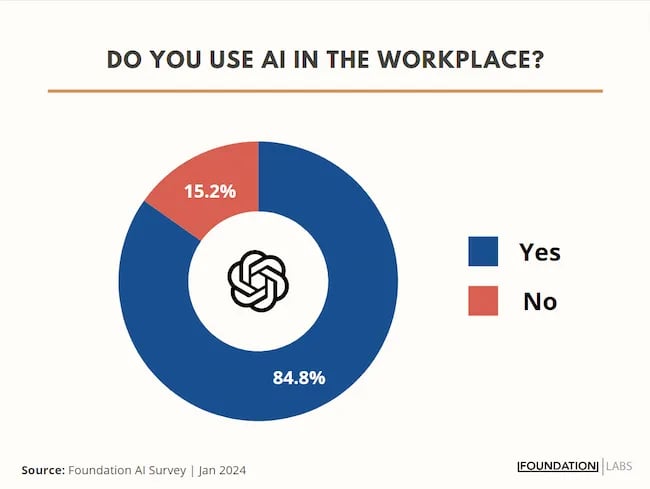
If you can overlook the fear-inducing headlines, this technology is making social media marketers more efficient and effective than ever. Translation: AI is good news for social media marketers.
In fact, I predict that the marketers not using AI in their workplace will be using it before the end of this year, and that number will move closer and closer to 100%.
Social media and AI are two of the most revolutionizing technologies of the last few decades. Social media has changed the way we live, and AI is changing the way we work.
So, I’m going to condense and share the data, research, tools, and strategies that the Foundation Marketing Team and I have been working on over the last year to help you better wield the collective power of AI and social media.
Let’s jump into it.
What’s the role of AI in social marketing strategy?
In a recent episode of my podcast, Create Like The Greats, we dove into some fascinating findings about the impact of AI on marketers and social media professionals. Take a listen here:
Let’s dive a bit deeper into the benefits of this technology:
Benefits of AI in Social Media Strategy
AI is to social media what a conductor is to an orchestra — it brings everything together with precision and purpose. The applications of AI in a social media strategy are vast, but the virtuosos are few who can wield its potential to its fullest.
AI to Conduct Customer Research
Imagine you’re a modern-day Indiana Jones, not dodging boulders or battling snakes, but rather navigating the vast, wild terrain of consumer preferences, trends, and feedback.
This is where AI thrives.
Using social media data, from posts on X to comments and shares, AI can take this information and turn it into insights surrounding your business and industry. Let’s say for example you’re a business that has 2,000 customer reviews on Google, Yelp, or a software review site like Capterra.
Leveraging AI you can now have all 2,000 of these customer reviews analyzed and summarized into an insightful report in a matter of minutes. You simply need to download all of them into a doc and then upload them to your favorite Generative Pre-trained Transformer (GPT) to get the insights and data you need.
But that’s not all.
You can become a Prompt Engineer and write ChatGPT asking it to help you better understand your audience. For example, if you’re trying to come up with a persona for people who enjoy marathons but also love kombucha you could write a prompt like this to ChatGPT:

The response that ChatGPT provided back is quite good:
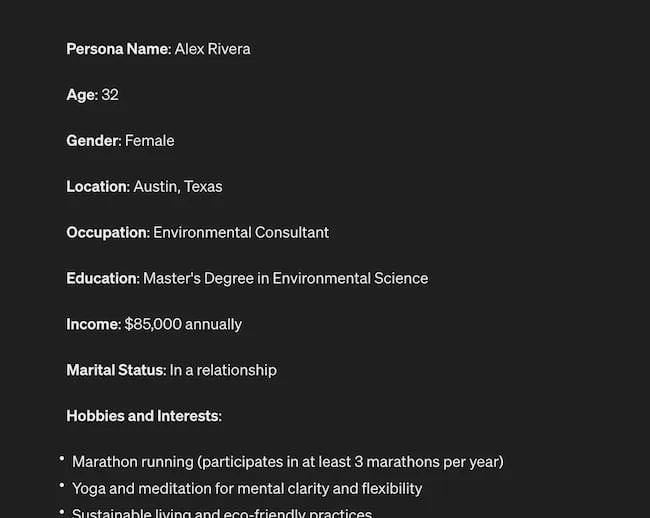
Below this it went even deeper by including a lot of valuable customer research data:
- Demographics
- Psychographics
- Consumer behaviors
- Needs and preferences
And best of all…
It also included marketing recommendations.
The power of AI is unbelievable.
Social Media Content Using AI
AI’s helping hand can be unburdening for the creative spirit.
Instead of marketers having to come up with new copy every single month for posts, AI Social Caption generators are making it easier than ever to craft catchy status updates in the matter of seconds.
Tools like HubSpot make it as easy as clicking a button and telling the AI tool what you’re looking to create a post about:
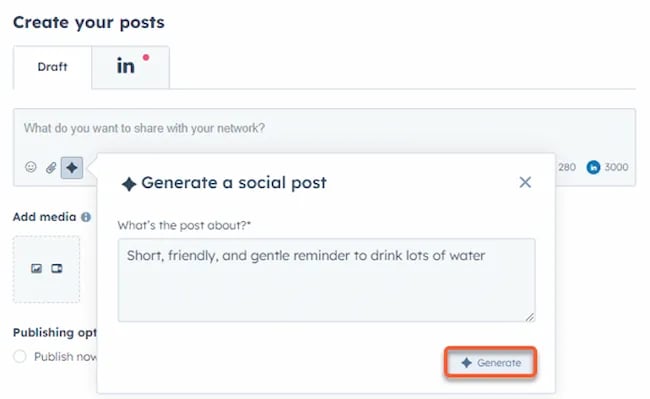
The best part of these AI tools is that they’re not limited to one channel.
Your AI social media content assistant can help you with LinkedIn content, X content, Facebook content, and even the captions that support your post on Instagram.
It can also help you navigate hashtags:
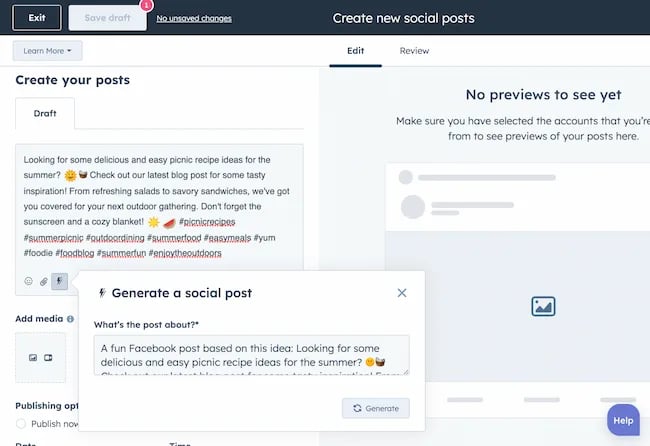
With AI social media tools that generate content ideas or even write posts, it’s not about robots replacing humans. It’s about making sure that the human creators on your team are focused on what really matters — adding that irreplaceable human touch.
Enhanced Personalization
You know that feeling when a brand gets you, like, really gets you?
AI makes that possible through targeted content that’s tailored with a level of personalization you’d think was fortune-telling if the data didn’t paint a starker, more rational picture.
What do I mean?
Brands can engage more quickly with AI than ever before. In the early 2000s, a lot of brands spent millions of dollars to create social media listening rooms where they would hire social media managers to find and engage with any conversation happening online.
Thanks to AI, brands now have the ability to do this at scale with much fewer people all while still delivering quality engagement with the recipient.
Analytics and Insights
Tapping into AI to dissect the data gives you a CSI-like precision to figure out what works, what doesn’t, and what makes your audience tick. It’s the difference between guessing and knowing.
The best part about AI is that it can give you almost any expert at your fingertips.
If you run a report surrounding the results of your social media content strategy directly from a site like LinkedIn, AI can review the top posts you’ve shared and give you clear feedback on what type of content is performing, why you should create more of it, and what days of the week your content is performing best.
This type of insight that would typically take hours to understand.
Now …
Thanks to the power of AI you can upload a spreadsheet filled with rows and columns of data just to be met with a handful of valuable insights a few minutes later.
Improved Customer Service
Want 24/7 support for your customers?
It’s now possible without human touch.
Chatbots powered by AI are taking the lead on direct messaging experiences for brands on Facebook and other Meta properties to offer round-the-clock assistance.
The fact that AI can be trained on past customer queries and data to inform future queries and problems is a powerful development for social media managers.
Advertising on Social Media with AI
The majority of ad networks have used some variation of AI to manage their bidding system for years. Now, thanks to AI and its ability to be incorporated in more tools, brands are now able to use AI to create better and more interesting ad campaigns than ever before.
Brands can use AI to create images using tools like Midjourney and DALL-E in seconds.
Brands can use AI to create better copy for their social media ads.
Brands can use AI tools to support their bidding strategies.
The power of AI and social media is continuing to evolve daily and it’s not exclusively found in the organic side of the coin. Paid media on social media is being shaken up due to AI just the same.
How to Implement AI into Your Social Media Strategy
Ready to hit “Go” on your AI-powered social media revolution?
Don’t just start the engine and hope for the best. Remember the importance of building a strategy first. In this video, you can learn some of the most important factors ranging from (but not limited to) SMART goals and leveraging influencers in your day-to-day work:
The following seven steps are crucial to building a social media strategy:
- Identify Your AI and Social Media Goals
- Validate Your AI-Related Assumptions
- Conduct Persona and Audience Research
- Select the Right Social Channels
- Identify Key Metrics and KPIs
- Choose the Right AI Tools
- Evaluate and Refine Your Social Media and AI Strategy
Keep reading, roll up your sleeves, and follow this roadmap:
1. Identify Your AI and Social Media Goals
If you’re just dipping your toes into the AI sea, start by defining clear objectives.
Is it to boost engagement? Streamline your content creation? Or simply understand your audience better? It’s important that you spend time understanding what you want to achieve.
For example, say you’re a content marketing agency like Foundation and you’re trying to increase your presence on LinkedIn. The specificity of this goal will help you understand the initiatives you want to achieve and determine which AI tools could help you make that happen.
Are there AI tools that will help you create content more efficiently? Are there AI tools that will help you optimize LinkedIn Ads? Are there AI tools that can help with content repurposing? All of these things are possible and having a goal clearly identified will help maximize the impact. Learn more in this Foundation Marketing piece on incorporating AI into your content workflow.
Once you have identified your goals, it’s time to get your team on board and assess what tools are available in the market.
Recommended Resources:
2. Validate Your AI-Related Assumptions
Assumptions are dangerous — especially when it comes to implementing new tech.
Don’t assume AI is going to fix all your problems.
Instead, start with small experiments and track their progress carefully.
3. Conduct Persona and Audience Research
Social media isn’t something that you can just jump into.
You need to understand your audience and ideal customers. AI can help with this, but you’ll need to be familiar with best practices. If you need a primer, this will help:
Once you understand the basics, consider ways in which AI can augment your approach.
4. Select the Right Social Channels
Not every social media channel is the same.
It’s important that you understand what channel is right for you and embrace it.
The way you use AI for X is going to be different from the way you use AI for LinkedIn. On X, you might use AI to help you develop a long-form thread that is filled with facts and figures. On LinkedIn however, you might use AI to repurpose a blog post and turn it into a carousel PDF. The content that works on X and that AI can facilitate creating is different from the content that you can create and use on LinkedIn.
The audiences are different.
The content formats are different.
So operate and create a plan accordingly.
Recommended Tools and Resources:
5. Identify Key Metrics and KPIs
What metrics are you trying to influence the most?
Spend time understanding the social media metrics that matter to your business and make sure that they’re prioritized as you think about the ways in which you use AI.
These are a few that matter most:
- Reach: Post reach signifies the count of unique users who viewed your post. How much of your content truly makes its way to users’ feeds?
- Clicks: This refers to the number of clicks on your content or account. Monitoring clicks per campaign is crucial for grasping what sparks curiosity or motivates people to make a purchase.
- Engagement: The total social interactions divided by the number of impressions. This metric reveals how effectively your audience perceives you and their readiness to engage.
Of course, it’s going to depend greatly on your business.
But with this information, you can ensure that your AI social media strategy is rooted in goals.
6. Choose the Right AI Tools
The AI landscape is filled with trash and treasure.
Pick AI tools that are most likely to align with your needs and your level of tech-savviness.
For example, if you’re a blogger creating content about pizza recipes, you can use HubSpot’s AI social caption generator to write the message on your behalf:
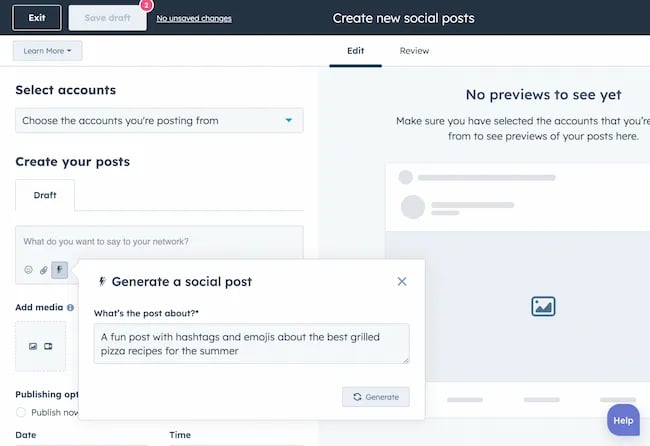
The benefit of an AI tool like HubSpot and the caption generator is that what at one point took 30-40 minutes to come up with — you can now have it at your fingertips in seconds. The HubSpot AI caption generator is trained on tons of data around social media content and makes it easy for you to get inspiration or final drafts on what can be used to create great content.
Consider your budget, the learning curve, and what kind of support the tool offers.
7. Evaluate and Refine Your Social Media and AI Strategy
AI isn’t a magic wand; it’s a set of complex tools and technology.
You need to be willing to pivot as things come to fruition.
If you notice that a certain activity is falling flat, consider how AI can support that process.
Did you notice that your engagement isn’t where you want it to be? Consider using an AI tool to assist with crafting more engaging social media posts.
Make AI Work for You — Now and in the Future
AI has the power to revolutionize your social media strategy in ways you may have never thought possible. With its ability to conduct customer research, create personalized content, and so much more, thinking about the future of social media is fascinating.
We’re going through one of the most interesting times in history.
Stay equipped to ride the way of AI and ensure that you’re embracing the best practices outlined in this piece to get the most out of the technology.
-

 PPC6 days ago
PPC6 days ago19 Best SEO Tools in 2024 (For Every Use Case)
-

 MARKETING7 days ago
MARKETING7 days agoEcommerce evolution: Blurring the lines between B2B and B2C
-
SEARCHENGINES5 days ago
Daily Search Forum Recap: April 19, 2024
-
SEARCHENGINES6 days ago
Daily Search Forum Recap: April 18, 2024
-

 WORDPRESS6 days ago
WORDPRESS6 days agoHow to Make $5000 of Passive Income Every Month in WordPress
-

 SEO6 days ago
SEO6 days ago2024 WordPress Vulnerability Report Shows Errors Sites Keep Making
-

 WORDPRESS6 days ago
WORDPRESS6 days ago10 Amazing WordPress Design Resouces – WordPress.com News
-
WORDPRESS7 days ago
[GET] The7 Website And Ecommerce Builder For WordPress










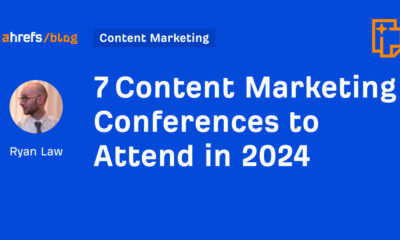



![How to Use AI For a More Effective Social Media Strategy, According to Ross Simmonds Download Now: The 2024 State of Social Media Trends [Free Report]](https://articles.entireweb.com/wp-content/uploads/2024/04/How-to-Use-AI-For-a-More-Effective-Social-Media.png)
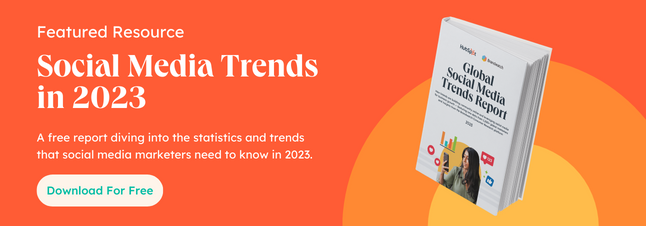


You must be logged in to post a comment Login